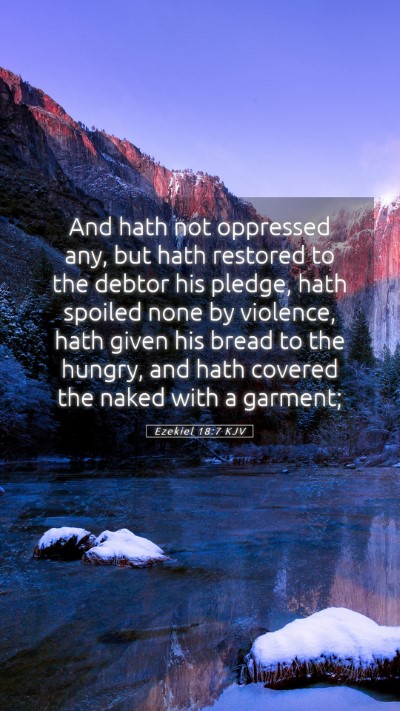Ezekiel 18:7 - Bible Verse Meaning and Interpretation
Verse: Ezekiel 18:7 - "And hath not oppressed any, but hath restored to the debtor his pledge, hath spoiled none by violence, hath given his bread to the hungry, and hath covered the naked with a garment."
Understanding Ezekiel 18:7
This verse emphasizes the qualities of righteousness and ethical financial dealings. It highlights a just person who does not exploit others, demonstrating the importance of integrity and compassion in one's dealings. The emphasis is placed on moral living that aligns with God’s standards of justice and mercy.
Bible Verse Explanations
In this commentary, we integrate insights from notable public domain commentaries, including those by Matthew Henry, Albert Barnes, and Adam Clarke, to deepen the understanding of Ezekiel 18:7.
Insights from Commentaries
-
Matthew Henry:
Henry points out that this verse illustrates how a righteous person lives by ethical principles, treating others with kindness and fairness. By restoring what is owed and providing for the needy, such individuals manifest the true nature of godliness.
-
Albert Barnes:
Barnes elaborates on the meaning of "restored to the debtor his pledge," indicating the importance of honoring one's commitments. This practice not only fortifies trust but reflects a godly character aligned with divine expectations.
-
Adam Clarke:
Clarke emphasizes the social aspect of righteousness, where not exploiting others and aiding those in need are significant. He draws attention to the moral imperative that those who are just must act benevolently within their communities.
Bible Verse Interpretations
The interpretations of this verse underline several critical themes:
- Righteousness: The standard for living a life pleasing to God is marked by integrity and compassion.
- Social Justice: Justice is not only legal but also relational, where helping the less fortunate is as important as adhering to laws.
- Accountability: Each individual is held accountable for their actions, which echoes the broader biblical principle of personal responsibility.
In-Depth Bible Verse Analysis
This verse can be understood as part of a broader conversation about individual moral accountability in relation to God's laws. The implications of the verse encourage readers to reflect on their own actions and behaviors towards others.
Historical Context
During Ezekiel's time, there were significant issues of social injustice and moral decay among the Israelites. By highlighting these aspects, the verse serves as a reminder of the divine expectation of ethical conduct.
Application of Ezekiel 18:7
For believers today, applying this verse means embodying principles of justice, such as restoring what is rightfully owed, helping those in need, and living with integrity. These actions are not just recommendations; they are mandates for living out one's faith.
Related Bible Cross References
- Leviticus 19:13 - "Thou shalt not defraud thy neighbor, neither rob him..."
- Proverbs 22:16 - "He that oppresseth the poor to increase his riches, and he that giveth to the rich, shall surely come to want."
- Matthew 7:12 - "Therefore all things whatsoever ye would that men should do to you, do ye even so to them..."
- James 2:15-16 - "If a brother or sister be naked, and destitute of daily food..."
Conclusion
In conclusion, Ezekiel 18:7 serves as a strong reminder of the moral and ethical responsibilities that every individual bears not only toward God but also to fellow humans. The teachings derived from public domain commentaries provide a rich understanding that can guide personal conduct, promote justice, and encourage compassion in daily life.
Further Study
For those engaging in bible study groups or online bible study, this verse can serve as a focus for discussion about integrity and community responsibility. Using bible study tools and guides, participants can dive deeper into its implications and how it can be applied in various life situations.


